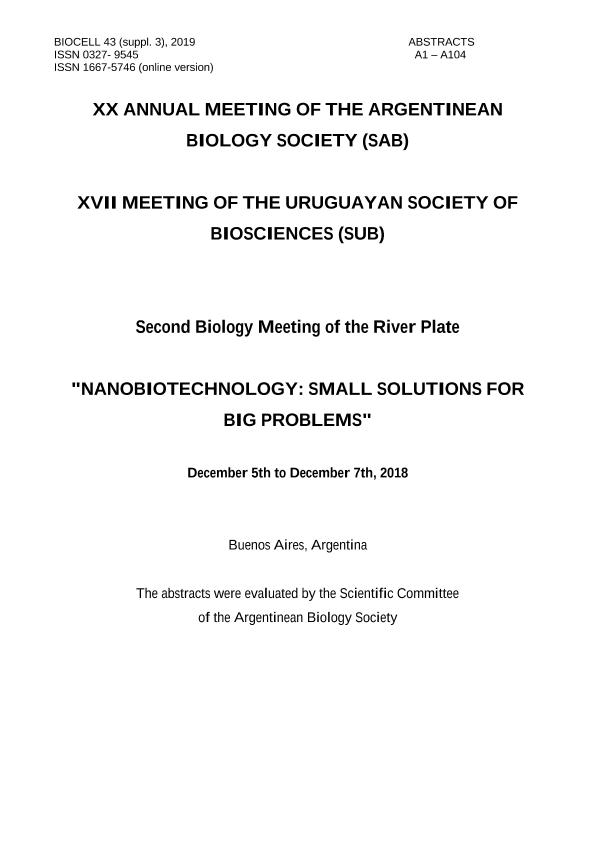Evento
Use of Viscera Extract from Surubim (Pseudoplatystoma corruscans) for the production of Casein Hydrolysate
Tipo del evento:
Reunión
Nombre del evento:
XX Annual Meeting of the Argentinean Biology Society and VII Meeting of the Uruguayan Society of Biosciences
Fecha del evento:
05/12/2018
Institución Organizadora:
Sociedad Argentina de Biología;
Sociedad Uruguaya de Biociencias;
Título de la revista:
Biocell
Editorial:
Tech Science Press
ISSN:
0327-9545
e-ISSN:
1667-5746
Idioma:
Inglés
Clasificación temática:
Resumen
Protein hydrolysates are mixtures of polypeptides, oligopeptides and amino acids that are manufactured from protein sources using partial hydrolysis. The method of preference is enzymatic hydrolysis since is easily controllable, quick, specific and it´s an affordable technology to produce high value-added products. This method is widely applied, not only to upgrade the functional and nutritional properties of proteins in the food industry, but also is used in other areas of biotechnology such as by providing specialized media for microorganisms grown in the laboratory. Today, the preparation of hydrolysates derived from milk proteins and casein has received much attention due to the diversity and unique functional properties. Proteases used to obtain a more selective hydrolysis of milk proteins are from different sources, between them fish viscera generated during the commercial processing. The Northeast of Argentina has native fish species cultivated, and of total aquaculture annual production, above 3300 tons, approximately 74 tons corresponds to surubím (Pseudoplatystoma coruscans). This freshwater fish is carnivorous so the viscera, that constitute the majority waste of processing, is a rich source of proteases. The objective of this work was to study the proteolytic activity of surubim viscera extract on casein. The extract was prepared from tissue that coats the stomach area near duodenum. Previous to proteolytic assays, the thermal stability of enzymatic extract by 2h (0, 8, 25, 37, 45, 50, 55, 60, 75 and 100 °C) and proteases inhibitors (soybean trypsin inhibitor -TBSI-, phenylmethylsulfonyl fluoride -PMSF- and disodium ethylenediaminetetraacetate -EDTA-Na2-) were assayed over Nα-Benzoyl-dl-arginine-p-nitroanilide (BApNA) as substrate. The proteolytic capacity of the extract was evaluated at 0, 1, 5, 15, 30 and 60 min, on casein. The cleavage of casein was analyzed by SDS-PAGE (14%, Coomassie Blue stain). The thermal stability profile of the viscera extract revealed that these fish enzymes were highly stables at temperatures below 55°C and they retained the 50% of their initial activity when they were incubated at 60 °C. In addition, the activity on BApNA was strongly inhibited by TBSI, whereas PMSF and EDTA-Na2 did not exhibit an effect on activity. The 60% of proteolytic activity on casein developed in one hour was achieved during the first 5 min. Simultaneously, the extract showed similar behavior by SDS-PAGE analysis. The typical bands of casein (αs1, β and κ) showed rapid degradation in a short incubation time. The results suggest that trypsin-like enzymes present on surubim viscera extract have high thermal stability. The studies on milk protein demonstrated the ability of the fish viscera extract to produce a casein hydrolysate. In this way, the findings presented in the current work demonstrate that the surubim viscera extract could be considered as a potentially strong candidate for future industrial applications, such as the obtaining of milk peptones for the cultivation of microorganisms.
Archivos asociados
Licencia
Identificadores
Colecciones
Eventos(IQUIBA-NEA)
Eventos de INSTITUTO DE QUIMICA BASICA Y APLICADA DEL NORDESTE ARGENTINO
Eventos de INSTITUTO DE QUIMICA BASICA Y APLICADA DEL NORDESTE ARGENTINO
Citación
Use of Viscera Extract from Surubim (Pseudoplatystoma corruscans) for the production of Casein Hydrolysate; XX Annual Meeting of the Argentinean Biology Society and VII Meeting of the Uruguayan Society of Biosciences; Buenos Aires; Argentina; 2018; 1-2
Compartir




